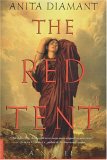Summary | Excerpt | Reading Guide | Reviews | Readalikes | Genres & Themes | Author Bio

Zilpah, the best spy among them, reported on the argument, telling how they haggled back and forth over my aunt's value, about how Laban stormed out and Jacob spat. Finally, they agreed on a year's service for a bride price. As to dowry, Laban pleaded poverty. "I have so little, my son," he said, suddenly the loving patriarch. "And she is such a treasure."
Jacob could not accept a bride without a dowry. That would have made Rachel a concubine and him a fool for paying with a year of his life for a girl who had only a grindstone, a spindle, and the clothes on her back to her name. So Laban threw Bilhah into the bargain, giving Rachel status as a dowered wife, and Jacob the possibility of a concubine in time.
"Also you must give me a tenth of the lambs and kids born to the flocks while I stand guard over them for you during my year of service," Jacob said.
At that, Laban cursed Jacob's seed and stormed away. It was a week before the men finished their negotiations, a week in which Rachel wept and carried on like a baby, while Leah said little and served nothing but cold millet porridge, food for mourners.
When they worked out the final terms, Laban went to Adah, so she could start planning the wedding. But Adah said no "We are not barbarians who give children to wed."
Rachel could not even be promised, she told her husband. The girl might look ready to marry, but she was still unripe, having not yet bled. My grandmother claimed that Anath would curse the garden if Laban dared break this law and that she herself would find the strength to take a pestle to her husband's head again.
But threats were unnecessary. Laban saw the advantage in this delay and went immediately to Jacob with the news he would have to wait until the girl was ready before they could plan a date for the marriage.
Jacob accepted the situation. What else could he do? Furious, Rachel yelled at Adah, who cuffed her and told her to take her temper elsewhere. Rachel, in turn, slapped Bilhah, cursed at Zilpah, and snarled at Leah. She even kicked dust at Jacob's feet, calling him a liar and a coward before bursting into pretty tears on his neck.
She began to nurse dark fears about the future. She would never bleed, never marry Jacob, never bear sons. Suddenly, the small, high breasts of which she had been so proud seemed puny to her. Perhaps she was a freak, a hermaphrodite like the gross idol in her father's tent, the one with a tree stalk between its legs and teats like a cow.
So Rachel tried to rush her season. Before the next new moon, she baked cakes of offering to the Queen of Heaven, something she had never done before, and slept a whole night with her belly pressed up against the base of the asherah. But the moon waned and grew round again, while Rachel's thighs remained dry. She walked into the village by herself to ask the midwife, Inna, for help and was given an infusion of ugly nettles that grew in a nearby wadi. But again the new moon came and again Rachel remained a child.
As the following moon waned, Rachel crushed bitter berries and called her older sisters to see the stain on her blanket. But the juice was purple, and Leah and Zilpah laughed at the seeds on her thighs.
The next month, Rachel hid in her tent, and did not even slip away once to find Jacob.
Finally, in the ninth month after Jacob's arrival, Rachel bled her first blood, and cried with relief. Adah, Leah, and Zilpah sang the piercing, throaty song that announces births, deaths, and women's ripening. As the sun set on the new moon when all the women commenced bleeding, they rubbed henna on Rachel's fingernails and on the soles of her feet. Her eyelids were painted yellow, and they slid every bangle, gem, and jewel that could be found onto her fingers, toes, ankles, and wrists. They covered her head with the finest embroidery and led her into the red tent. They sang songs for the goddesses; for Innana and the Lady Asherah of the Sea. They spoke of Elath, the mother of the seventy gods, including Anath in that number, Anath the nursemaid, defender of mothers.
Copyright Anita Diamant 1997. All rights reserved. Reprinted with the permission of the publisher, St Martin's Press.
Judge a man by his questions rather than by his answers.
Click Here to find out who said this, as well as discovering other famous literary quotes!
Your guide toexceptional books
BookBrowse seeks out and recommends the best in contemporary fiction and nonfiction—books that not only engage and entertain but also deepen our understanding of ourselves and the world around us.